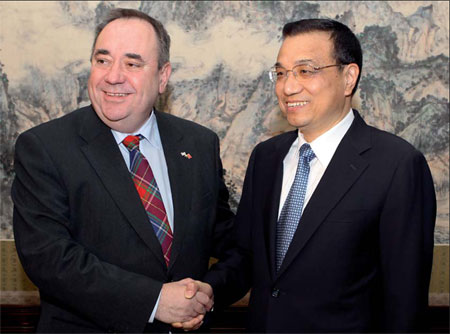Leader sees China links key to Scotland's future
Updated: 2011-12-30 11:24
By David Bartram (China Daily European Weekly)
|
|||||||||
 |
|
Vice-Premier Li Keqiang meets visiting Scottish First Minister Alex Salmond in Beijing on Dec 5. Wu Zhiyi / China Daily |
As Tian Tian and Yang Guang touched down in Edinburgh at the start of December, Scotland's First Minister Alex Salmond arrived in Beijing for a week-long visit, determined to build on bilateral relations at a time of uncertainty for both Scotland and the United Kingdom as a whole.
Upon arrival in Beijing, Salmond wryly noted that if he was the swap for the two giant pandas, Scotland had probably got the better of the deal. Both the pandas and Salmond's visit are indications of Scotland's commitment to closer ties with China.
"My third visit to China as first minister was an important one," says Salmond, Scotland's first minister since 2007. "I sought to strengthen relations between our two countries both in terms of trade and in terms of wider cultural exchanges that can enrich the lives of our citizens."
The timing of Salmond's visit was significant. Back in Europe, David Cameron's veto of the latest proposed EU treaty threatens to send the UK into isolation from the rest of the continent.
Salmond's Scottish National Party's landslide victory at the Scottish elections in May has made the prospect of a referendum on full independence a very real possibility. It is of little surprise that he should be looking to strengthen Scottish ties elsewhere at this time.
"While our relations with China have strengthened in recent years I realize that, like any friendship, we must show continuing commitment," Salmond says.
During the visit, a series of cultural and business links was announced, including deals to see more artistic exchanges between the two. Plans were also laid out to encourage regional links at local government level.
"I pledged the Scottish government's support for further partnerships with Shandong province, and to forge new cultural, educational and commercial links with Shenzhen - with whom we will also explore a twinning arrangement with a Scottish city."
Salmond also spoke at the Party School of the CPC Central Committee in Beijing, a rare privilege for foreign politicians, addressing senior officials from across China on climate change. He argued for greater international cooperation to tackle the problem and presented the school with a sculpture of 18th century Scottish thinker Adam Smith.
"One of my highlights of the visit was giving a keynote speech to the Party School. I chose as my topic climate justice - the need to put people at the heart of our economic system, and allow all to share the burdens of climate change and benefits of tackling it."
These benefits were just one of several areas Salmond discussed with Vice-Premier Li Keqiang, in hope that Scotland and China can forge closer ties. It is hoped that the meeting will pave the way not only for major Chinese investment in Scotland, but also for an expansion of Scottish technical expertise into China.
"I was very pleased to meet Vice-Premier Li Keqiang again, to discuss areas for further Sino-Scot collaboration in areas such as healthcare and infrastructure. I also had a very positive discussion about major infrastructure projects in Scotland with the China Investment Corporation, which we will welcome to Scotland next year."
Infrastructure was central to the discussions, with hopes of developing a direct air link between Scotland and China in the coming years as a way of increasing bilateral exchanges.
"I am looking forward to the arrival of a senior Chinese aviation industry delegation in 2012 to explore a direct air link," Salmond says. "Our entire delegation - 'Team Scotland' - was warmly welcomed by all of our hosts and I can promise our visitors from China a very warm Scottish welcome in the coming months and years."
Of course it is not inconceivable that Salmond might be welcoming these Chinese visitors not only as head of the Scottish government, but as head of an independent Scotland a few years down the line.
By laying the groundwork now, Salmond is ensuring that should Scotland split from the UK, the country will have established independent relations with global superpowers such as China upon which to build.
"As Vice-Premier Li Keqiang remarked when I welcomed him to Edinburgh Castle in January, Scotland is a land of invention. Of course, so too is the great nation of China and it is by working together in areas of common advantage, experience and innovation that our two nations can most effectively provide solutions to wider global challenges.
"Of course, with such challenges, come opportunities and I am determined that Scotland, working with China, seizes those opportunities."











